Business Skills & The 2008 Financial Crisis
VerifiedAdded on 2020/02/14
|8
|2205
|157
AI Summary
This assignment examines the importance of business skills within organizations, particularly in light of the 2008 Global Financial Crisis. It explores the argument that bankers' focus on personal bonuses, driven by financial institutions, contributed to the crisis. The text highlights the need for organizations to develop robust business skills to avoid similar issues in the future.
Contribute Materials
Your contribution can guide someone’s learning journey. Share your
documents today.

BUSINESS SKILLS
(REPORT)
(REPORT)
Secure Best Marks with AI Grader
Need help grading? Try our AI Grader for instant feedback on your assignments.
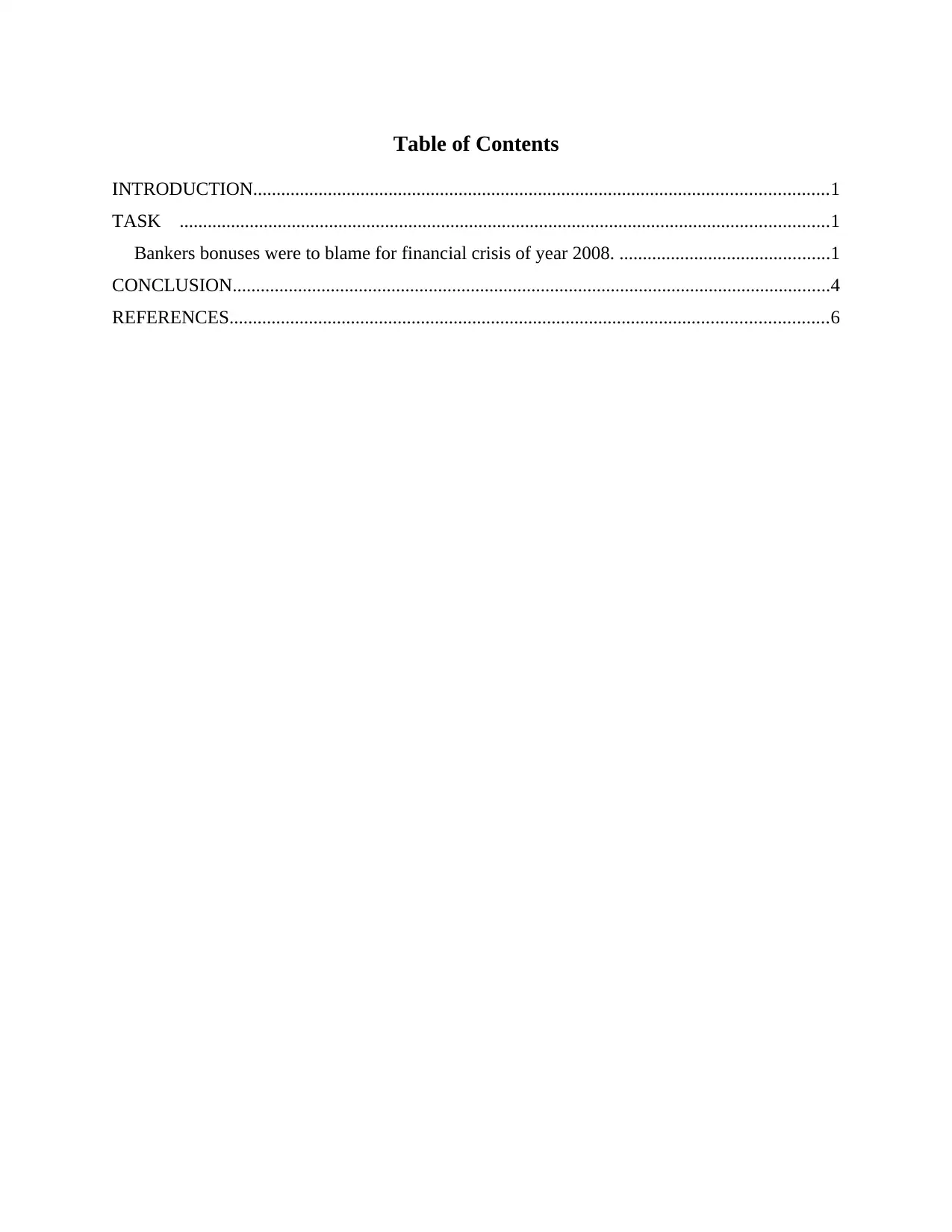
Table of Contents
INTRODUCTION...........................................................................................................................1
TASK ...........................................................................................................................................1
Bankers bonuses were to blame for financial crisis of year 2008. .............................................1
CONCLUSION................................................................................................................................4
REFERENCES................................................................................................................................6
INTRODUCTION...........................................................................................................................1
TASK ...........................................................................................................................................1
Bankers bonuses were to blame for financial crisis of year 2008. .............................................1
CONCLUSION................................................................................................................................4
REFERENCES................................................................................................................................6
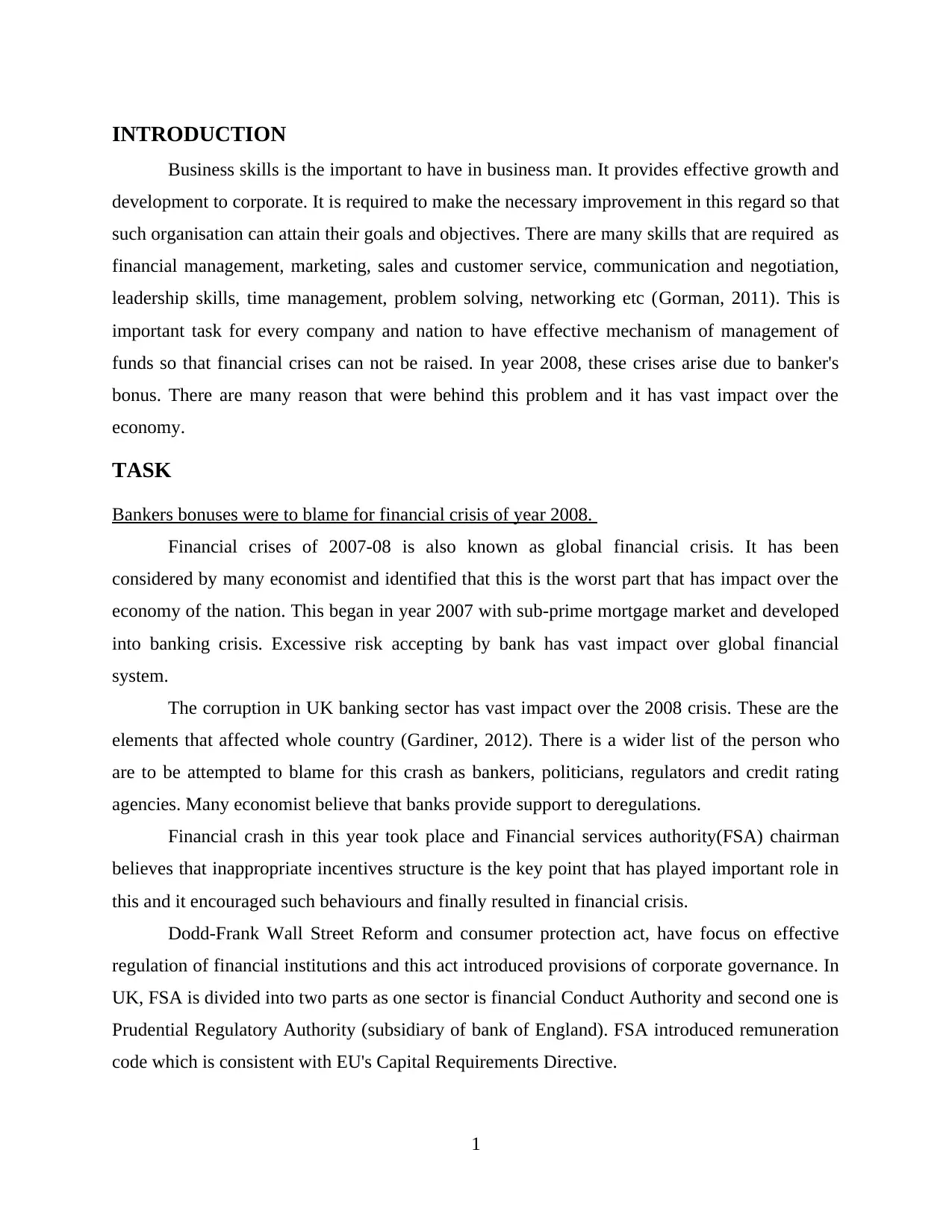
INTRODUCTION
Business skills is the important to have in business man. It provides effective growth and
development to corporate. It is required to make the necessary improvement in this regard so that
such organisation can attain their goals and objectives. There are many skills that are required as
financial management, marketing, sales and customer service, communication and negotiation,
leadership skills, time management, problem solving, networking etc (Gorman, 2011). This is
important task for every company and nation to have effective mechanism of management of
funds so that financial crises can not be raised. In year 2008, these crises arise due to banker's
bonus. There are many reason that were behind this problem and it has vast impact over the
economy.
TASK
Bankers bonuses were to blame for financial crisis of year 2008.
Financial crises of 2007-08 is also known as global financial crisis. It has been
considered by many economist and identified that this is the worst part that has impact over the
economy of the nation. This began in year 2007 with sub-prime mortgage market and developed
into banking crisis. Excessive risk accepting by bank has vast impact over global financial
system.
The corruption in UK banking sector has vast impact over the 2008 crisis. These are the
elements that affected whole country (Gardiner, 2012). There is a wider list of the person who
are to be attempted to blame for this crash as bankers, politicians, regulators and credit rating
agencies. Many economist believe that banks provide support to deregulations.
Financial crash in this year took place and Financial services authority(FSA) chairman
believes that inappropriate incentives structure is the key point that has played important role in
this and it encouraged such behaviours and finally resulted in financial crisis.
Dodd-Frank Wall Street Reform and consumer protection act, have focus on effective
regulation of financial institutions and this act introduced provisions of corporate governance. In
UK, FSA is divided into two parts as one sector is financial Conduct Authority and second one is
Prudential Regulatory Authority (subsidiary of bank of England). FSA introduced remuneration
code which is consistent with EU's Capital Requirements Directive.
1
Business skills is the important to have in business man. It provides effective growth and
development to corporate. It is required to make the necessary improvement in this regard so that
such organisation can attain their goals and objectives. There are many skills that are required as
financial management, marketing, sales and customer service, communication and negotiation,
leadership skills, time management, problem solving, networking etc (Gorman, 2011). This is
important task for every company and nation to have effective mechanism of management of
funds so that financial crises can not be raised. In year 2008, these crises arise due to banker's
bonus. There are many reason that were behind this problem and it has vast impact over the
economy.
TASK
Bankers bonuses were to blame for financial crisis of year 2008.
Financial crises of 2007-08 is also known as global financial crisis. It has been
considered by many economist and identified that this is the worst part that has impact over the
economy of the nation. This began in year 2007 with sub-prime mortgage market and developed
into banking crisis. Excessive risk accepting by bank has vast impact over global financial
system.
The corruption in UK banking sector has vast impact over the 2008 crisis. These are the
elements that affected whole country (Gardiner, 2012). There is a wider list of the person who
are to be attempted to blame for this crash as bankers, politicians, regulators and credit rating
agencies. Many economist believe that banks provide support to deregulations.
Financial crash in this year took place and Financial services authority(FSA) chairman
believes that inappropriate incentives structure is the key point that has played important role in
this and it encouraged such behaviours and finally resulted in financial crisis.
Dodd-Frank Wall Street Reform and consumer protection act, have focus on effective
regulation of financial institutions and this act introduced provisions of corporate governance. In
UK, FSA is divided into two parts as one sector is financial Conduct Authority and second one is
Prudential Regulatory Authority (subsidiary of bank of England). FSA introduced remuneration
code which is consistent with EU's Capital Requirements Directive.
1
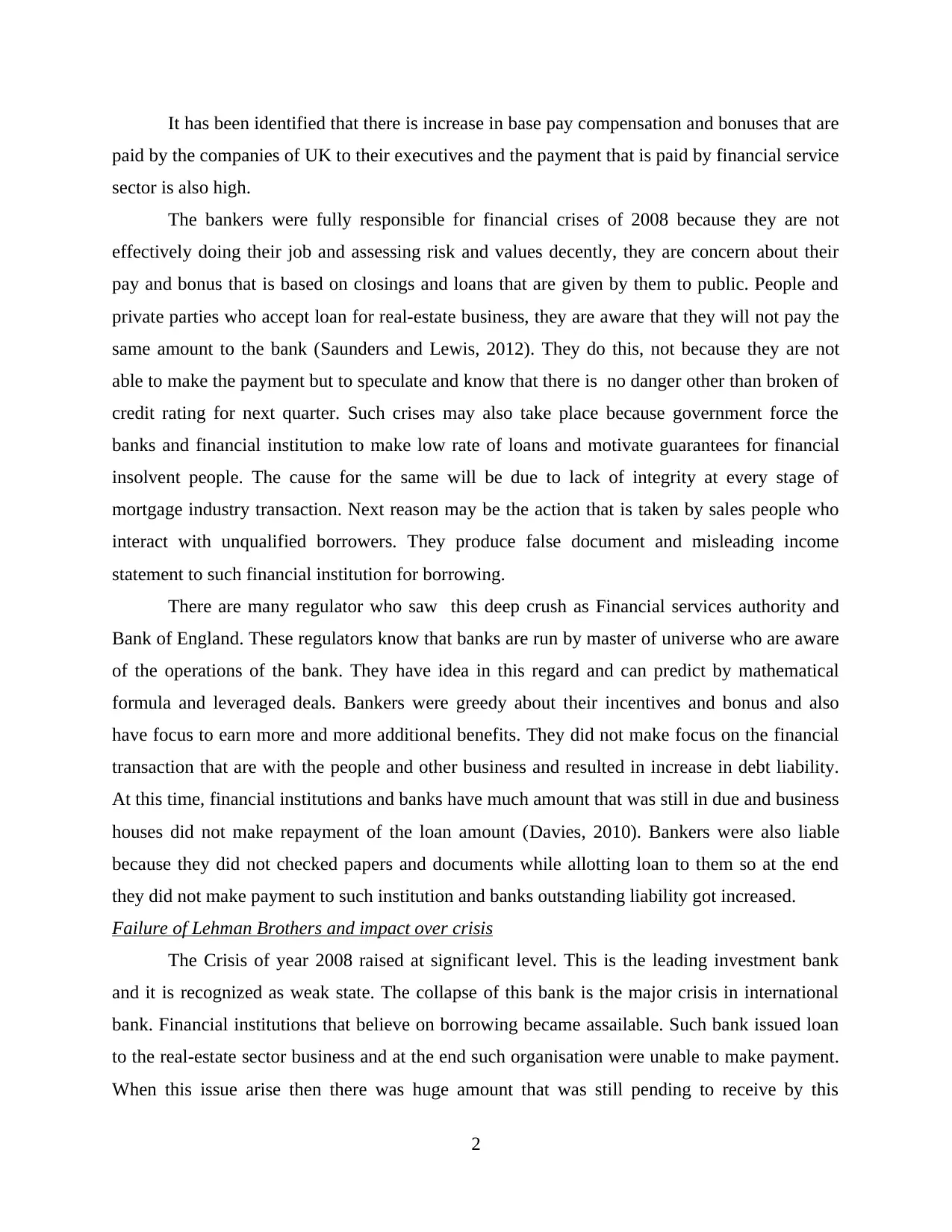
It has been identified that there is increase in base pay compensation and bonuses that are
paid by the companies of UK to their executives and the payment that is paid by financial service
sector is also high.
The bankers were fully responsible for financial crises of 2008 because they are not
effectively doing their job and assessing risk and values decently, they are concern about their
pay and bonus that is based on closings and loans that are given by them to public. People and
private parties who accept loan for real-estate business, they are aware that they will not pay the
same amount to the bank (Saunders and Lewis, 2012). They do this, not because they are not
able to make the payment but to speculate and know that there is no danger other than broken of
credit rating for next quarter. Such crises may also take place because government force the
banks and financial institution to make low rate of loans and motivate guarantees for financial
insolvent people. The cause for the same will be due to lack of integrity at every stage of
mortgage industry transaction. Next reason may be the action that is taken by sales people who
interact with unqualified borrowers. They produce false document and misleading income
statement to such financial institution for borrowing.
There are many regulator who saw this deep crush as Financial services authority and
Bank of England. These regulators know that banks are run by master of universe who are aware
of the operations of the bank. They have idea in this regard and can predict by mathematical
formula and leveraged deals. Bankers were greedy about their incentives and bonus and also
have focus to earn more and more additional benefits. They did not make focus on the financial
transaction that are with the people and other business and resulted in increase in debt liability.
At this time, financial institutions and banks have much amount that was still in due and business
houses did not make repayment of the loan amount (Davies, 2010). Bankers were also liable
because they did not checked papers and documents while allotting loan to them so at the end
they did not make payment to such institution and banks outstanding liability got increased.
Failure of Lehman Brothers and impact over crisis
The Crisis of year 2008 raised at significant level. This is the leading investment bank
and it is recognized as weak state. The collapse of this bank is the major crisis in international
bank. Financial institutions that believe on borrowing became assailable. Such bank issued loan
to the real-estate sector business and at the end such organisation were unable to make payment.
When this issue arise then there was huge amount that was still pending to receive by this
2
paid by the companies of UK to their executives and the payment that is paid by financial service
sector is also high.
The bankers were fully responsible for financial crises of 2008 because they are not
effectively doing their job and assessing risk and values decently, they are concern about their
pay and bonus that is based on closings and loans that are given by them to public. People and
private parties who accept loan for real-estate business, they are aware that they will not pay the
same amount to the bank (Saunders and Lewis, 2012). They do this, not because they are not
able to make the payment but to speculate and know that there is no danger other than broken of
credit rating for next quarter. Such crises may also take place because government force the
banks and financial institution to make low rate of loans and motivate guarantees for financial
insolvent people. The cause for the same will be due to lack of integrity at every stage of
mortgage industry transaction. Next reason may be the action that is taken by sales people who
interact with unqualified borrowers. They produce false document and misleading income
statement to such financial institution for borrowing.
There are many regulator who saw this deep crush as Financial services authority and
Bank of England. These regulators know that banks are run by master of universe who are aware
of the operations of the bank. They have idea in this regard and can predict by mathematical
formula and leveraged deals. Bankers were greedy about their incentives and bonus and also
have focus to earn more and more additional benefits. They did not make focus on the financial
transaction that are with the people and other business and resulted in increase in debt liability.
At this time, financial institutions and banks have much amount that was still in due and business
houses did not make repayment of the loan amount (Davies, 2010). Bankers were also liable
because they did not checked papers and documents while allotting loan to them so at the end
they did not make payment to such institution and banks outstanding liability got increased.
Failure of Lehman Brothers and impact over crisis
The Crisis of year 2008 raised at significant level. This is the leading investment bank
and it is recognized as weak state. The collapse of this bank is the major crisis in international
bank. Financial institutions that believe on borrowing became assailable. Such bank issued loan
to the real-estate sector business and at the end such organisation were unable to make payment.
When this issue arise then there was huge amount that was still pending to receive by this
2
Secure Best Marks with AI Grader
Need help grading? Try our AI Grader for instant feedback on your assignments.
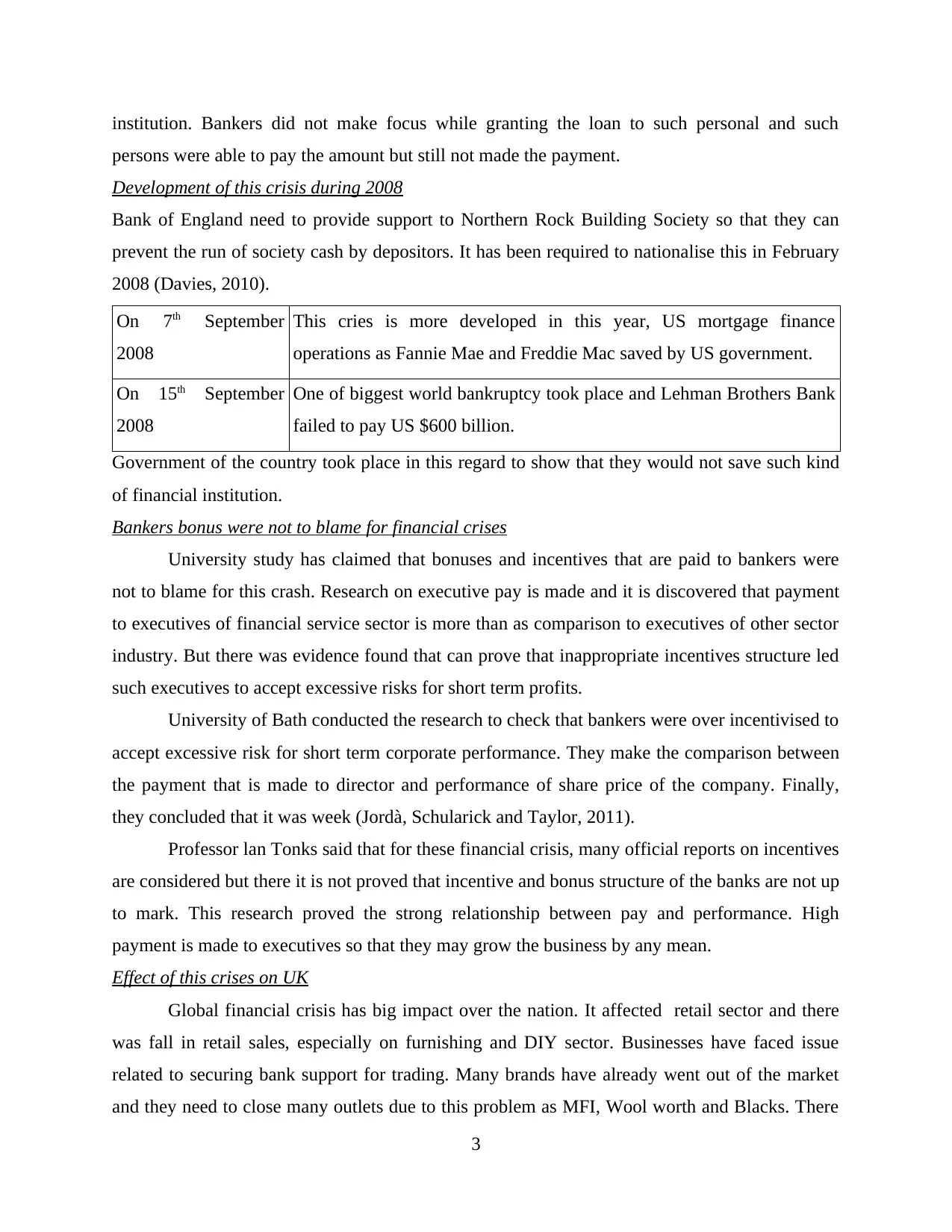
institution. Bankers did not make focus while granting the loan to such personal and such
persons were able to pay the amount but still not made the payment.
Development of this crisis during 2008
Bank of England need to provide support to Northern Rock Building Society so that they can
prevent the run of society cash by depositors. It has been required to nationalise this in February
2008 (Davies, 2010).
On 7th September
2008
This cries is more developed in this year, US mortgage finance
operations as Fannie Mae and Freddie Mac saved by US government.
On 15th September
2008
One of biggest world bankruptcy took place and Lehman Brothers Bank
failed to pay US $600 billion.
Government of the country took place in this regard to show that they would not save such kind
of financial institution.
Bankers bonus were not to blame for financial crises
University study has claimed that bonuses and incentives that are paid to bankers were
not to blame for this crash. Research on executive pay is made and it is discovered that payment
to executives of financial service sector is more than as comparison to executives of other sector
industry. But there was evidence found that can prove that inappropriate incentives structure led
such executives to accept excessive risks for short term profits.
University of Bath conducted the research to check that bankers were over incentivised to
accept excessive risk for short term corporate performance. They make the comparison between
the payment that is made to director and performance of share price of the company. Finally,
they concluded that it was week (Jordà, Schularick and Taylor, 2011).
Professor lan Tonks said that for these financial crisis, many official reports on incentives
are considered but there it is not proved that incentive and bonus structure of the banks are not up
to mark. This research proved the strong relationship between pay and performance. High
payment is made to executives so that they may grow the business by any mean.
Effect of this crises on UK
Global financial crisis has big impact over the nation. It affected retail sector and there
was fall in retail sales, especially on furnishing and DIY sector. Businesses have faced issue
related to securing bank support for trading. Many brands have already went out of the market
and they need to close many outlets due to this problem as MFI, Wool worth and Blacks. There
3
persons were able to pay the amount but still not made the payment.
Development of this crisis during 2008
Bank of England need to provide support to Northern Rock Building Society so that they can
prevent the run of society cash by depositors. It has been required to nationalise this in February
2008 (Davies, 2010).
On 7th September
2008
This cries is more developed in this year, US mortgage finance
operations as Fannie Mae and Freddie Mac saved by US government.
On 15th September
2008
One of biggest world bankruptcy took place and Lehman Brothers Bank
failed to pay US $600 billion.
Government of the country took place in this regard to show that they would not save such kind
of financial institution.
Bankers bonus were not to blame for financial crises
University study has claimed that bonuses and incentives that are paid to bankers were
not to blame for this crash. Research on executive pay is made and it is discovered that payment
to executives of financial service sector is more than as comparison to executives of other sector
industry. But there was evidence found that can prove that inappropriate incentives structure led
such executives to accept excessive risks for short term profits.
University of Bath conducted the research to check that bankers were over incentivised to
accept excessive risk for short term corporate performance. They make the comparison between
the payment that is made to director and performance of share price of the company. Finally,
they concluded that it was week (Jordà, Schularick and Taylor, 2011).
Professor lan Tonks said that for these financial crisis, many official reports on incentives
are considered but there it is not proved that incentive and bonus structure of the banks are not up
to mark. This research proved the strong relationship between pay and performance. High
payment is made to executives so that they may grow the business by any mean.
Effect of this crises on UK
Global financial crisis has big impact over the nation. It affected retail sector and there
was fall in retail sales, especially on furnishing and DIY sector. Businesses have faced issue
related to securing bank support for trading. Many brands have already went out of the market
and they need to close many outlets due to this problem as MFI, Wool worth and Blacks. There
3
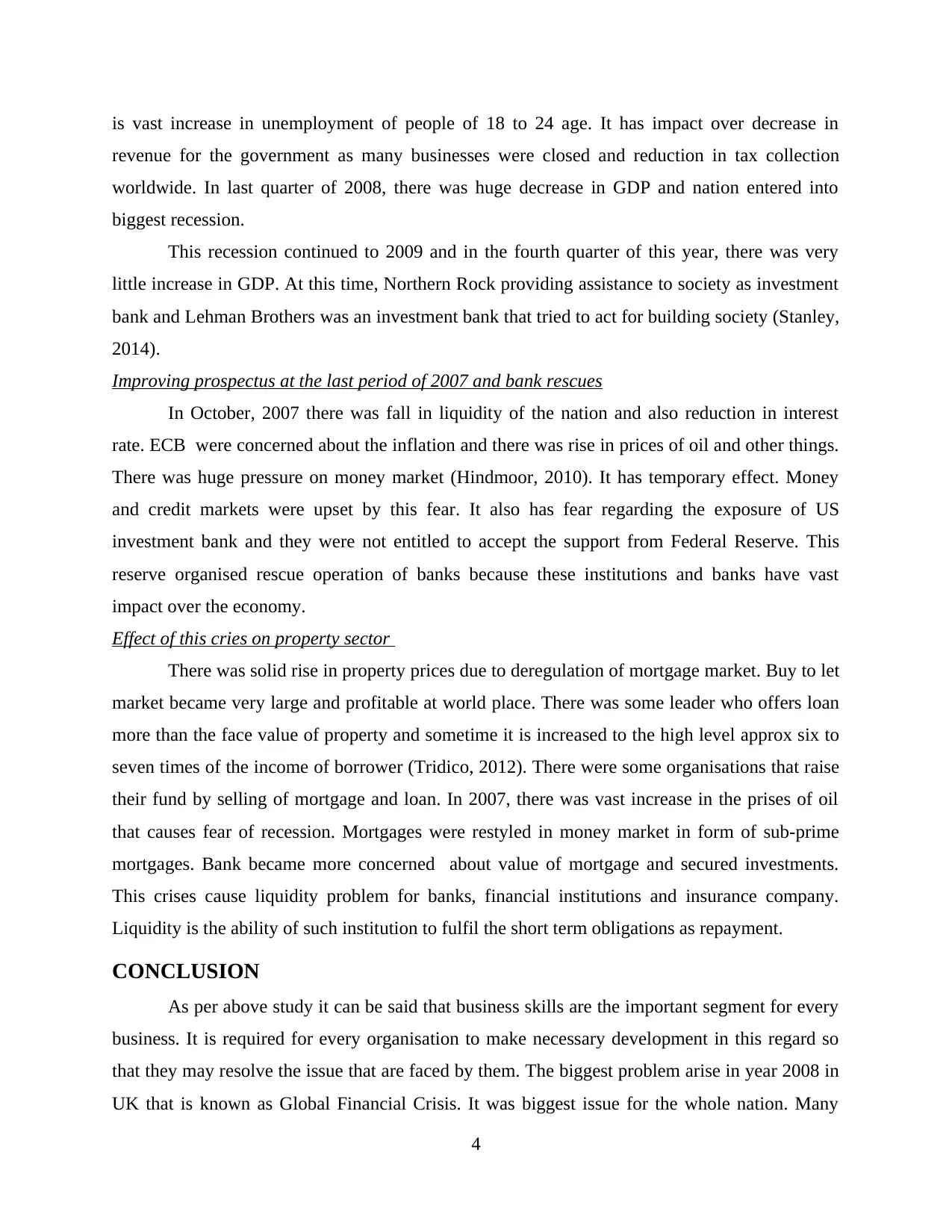
is vast increase in unemployment of people of 18 to 24 age. It has impact over decrease in
revenue for the government as many businesses were closed and reduction in tax collection
worldwide. In last quarter of 2008, there was huge decrease in GDP and nation entered into
biggest recession.
This recession continued to 2009 and in the fourth quarter of this year, there was very
little increase in GDP. At this time, Northern Rock providing assistance to society as investment
bank and Lehman Brothers was an investment bank that tried to act for building society (Stanley,
2014).
Improving prospectus at the last period of 2007 and bank rescues
In October, 2007 there was fall in liquidity of the nation and also reduction in interest
rate. ECB were concerned about the inflation and there was rise in prices of oil and other things.
There was huge pressure on money market (Hindmoor, 2010). It has temporary effect. Money
and credit markets were upset by this fear. It also has fear regarding the exposure of US
investment bank and they were not entitled to accept the support from Federal Reserve. This
reserve organised rescue operation of banks because these institutions and banks have vast
impact over the economy.
Effect of this cries on property sector
There was solid rise in property prices due to deregulation of mortgage market. Buy to let
market became very large and profitable at world place. There was some leader who offers loan
more than the face value of property and sometime it is increased to the high level approx six to
seven times of the income of borrower (Tridico, 2012). There were some organisations that raise
their fund by selling of mortgage and loan. In 2007, there was vast increase in the prises of oil
that causes fear of recession. Mortgages were restyled in money market in form of sub-prime
mortgages. Bank became more concerned about value of mortgage and secured investments.
This crises cause liquidity problem for banks, financial institutions and insurance company.
Liquidity is the ability of such institution to fulfil the short term obligations as repayment.
CONCLUSION
As per above study it can be said that business skills are the important segment for every
business. It is required for every organisation to make necessary development in this regard so
that they may resolve the issue that are faced by them. The biggest problem arise in year 2008 in
UK that is known as Global Financial Crisis. It was biggest issue for the whole nation. Many
4
revenue for the government as many businesses were closed and reduction in tax collection
worldwide. In last quarter of 2008, there was huge decrease in GDP and nation entered into
biggest recession.
This recession continued to 2009 and in the fourth quarter of this year, there was very
little increase in GDP. At this time, Northern Rock providing assistance to society as investment
bank and Lehman Brothers was an investment bank that tried to act for building society (Stanley,
2014).
Improving prospectus at the last period of 2007 and bank rescues
In October, 2007 there was fall in liquidity of the nation and also reduction in interest
rate. ECB were concerned about the inflation and there was rise in prices of oil and other things.
There was huge pressure on money market (Hindmoor, 2010). It has temporary effect. Money
and credit markets were upset by this fear. It also has fear regarding the exposure of US
investment bank and they were not entitled to accept the support from Federal Reserve. This
reserve organised rescue operation of banks because these institutions and banks have vast
impact over the economy.
Effect of this cries on property sector
There was solid rise in property prices due to deregulation of mortgage market. Buy to let
market became very large and profitable at world place. There was some leader who offers loan
more than the face value of property and sometime it is increased to the high level approx six to
seven times of the income of borrower (Tridico, 2012). There were some organisations that raise
their fund by selling of mortgage and loan. In 2007, there was vast increase in the prises of oil
that causes fear of recession. Mortgages were restyled in money market in form of sub-prime
mortgages. Bank became more concerned about value of mortgage and secured investments.
This crises cause liquidity problem for banks, financial institutions and insurance company.
Liquidity is the ability of such institution to fulfil the short term obligations as repayment.
CONCLUSION
As per above study it can be said that business skills are the important segment for every
business. It is required for every organisation to make necessary development in this regard so
that they may resolve the issue that are faced by them. The biggest problem arise in year 2008 in
UK that is known as Global Financial Crisis. It was biggest issue for the whole nation. Many
4
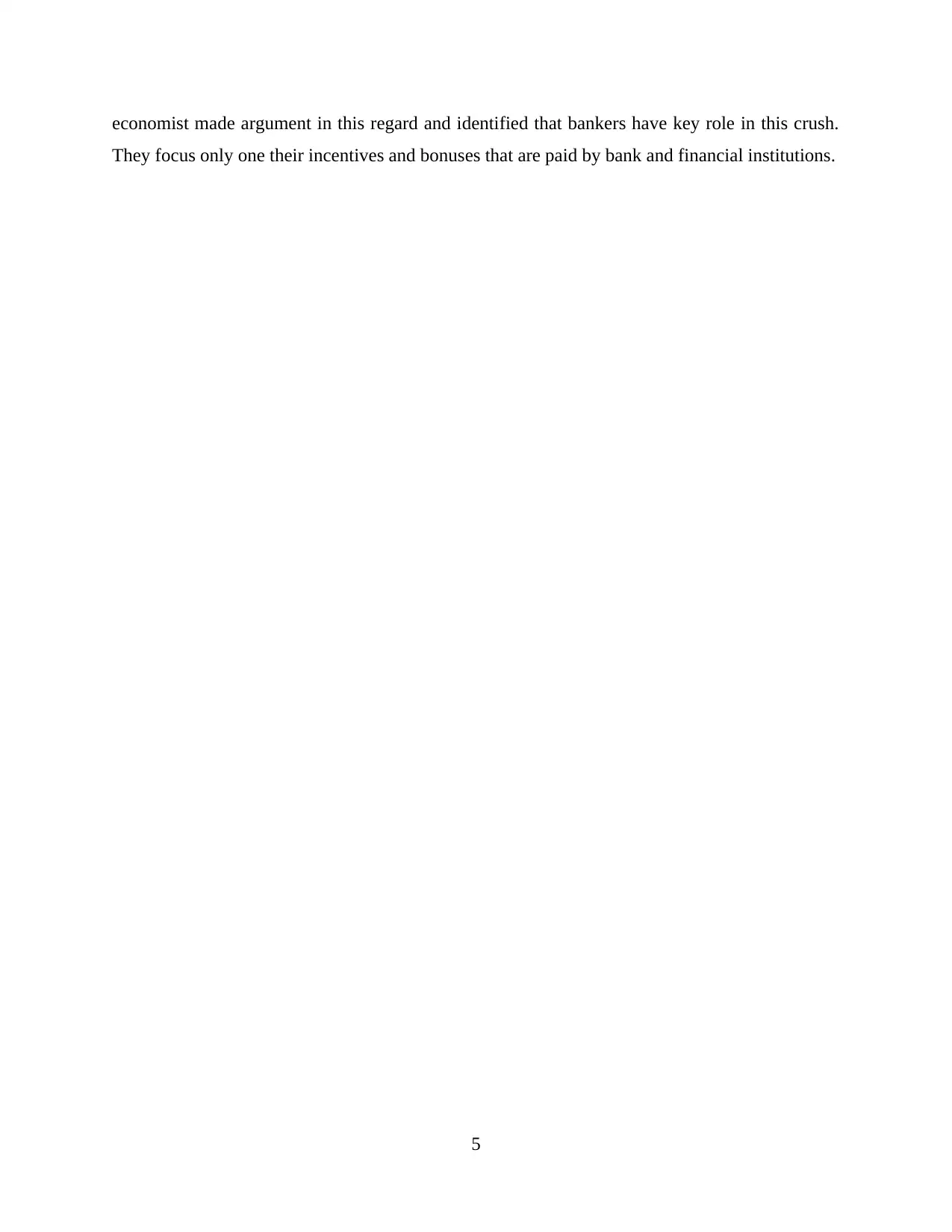
economist made argument in this regard and identified that bankers have key role in this crush.
They focus only one their incentives and bonuses that are paid by bank and financial institutions.
5
They focus only one their incentives and bonuses that are paid by bank and financial institutions.
5
Paraphrase This Document
Need a fresh take? Get an instant paraphrase of this document with our AI Paraphraser
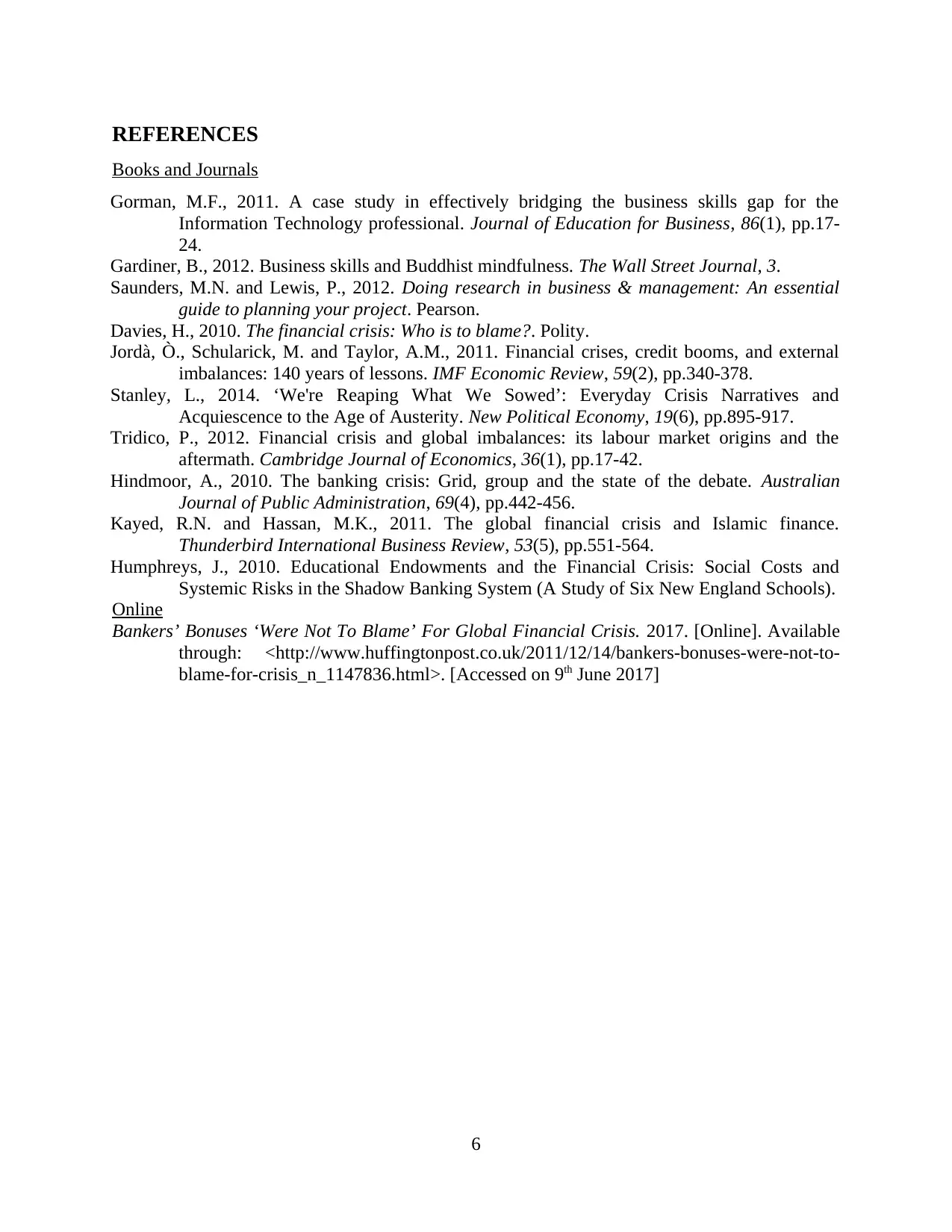
REFERENCES
Books and Journals
Gorman, M.F., 2011. A case study in effectively bridging the business skills gap for the
Information Technology professional. Journal of Education for Business, 86(1), pp.17-
24.
Gardiner, B., 2012. Business skills and Buddhist mindfulness. The Wall Street Journal, 3.
Saunders, M.N. and Lewis, P., 2012. Doing research in business & management: An essential
guide to planning your project. Pearson.
Davies, H., 2010. The financial crisis: Who is to blame?. Polity.
Jordà, Ò., Schularick, M. and Taylor, A.M., 2011. Financial crises, credit booms, and external
imbalances: 140 years of lessons. IMF Economic Review, 59(2), pp.340-378.
Stanley, L., 2014. ‘We're Reaping What We Sowed’: Everyday Crisis Narratives and
Acquiescence to the Age of Austerity. New Political Economy, 19(6), pp.895-917.
Tridico, P., 2012. Financial crisis and global imbalances: its labour market origins and the
aftermath. Cambridge Journal of Economics, 36(1), pp.17-42.
Hindmoor, A., 2010. The banking crisis: Grid, group and the state of the debate. Australian
Journal of Public Administration, 69(4), pp.442-456.
Kayed, R.N. and Hassan, M.K., 2011. The global financial crisis and Islamic finance.
Thunderbird International Business Review, 53(5), pp.551-564.
Humphreys, J., 2010. Educational Endowments and the Financial Crisis: Social Costs and
Systemic Risks in the Shadow Banking System (A Study of Six New England Schools).
Online
Bankers’ Bonuses ‘Were Not To Blame’ For Global Financial Crisis. 2017. [Online]. Available
through: <http://www.huffingtonpost.co.uk/2011/12/14/bankers-bonuses-were-not-to-
blame-for-crisis_n_1147836.html>. [Accessed on 9th June 2017]
6
Books and Journals
Gorman, M.F., 2011. A case study in effectively bridging the business skills gap for the
Information Technology professional. Journal of Education for Business, 86(1), pp.17-
24.
Gardiner, B., 2012. Business skills and Buddhist mindfulness. The Wall Street Journal, 3.
Saunders, M.N. and Lewis, P., 2012. Doing research in business & management: An essential
guide to planning your project. Pearson.
Davies, H., 2010. The financial crisis: Who is to blame?. Polity.
Jordà, Ò., Schularick, M. and Taylor, A.M., 2011. Financial crises, credit booms, and external
imbalances: 140 years of lessons. IMF Economic Review, 59(2), pp.340-378.
Stanley, L., 2014. ‘We're Reaping What We Sowed’: Everyday Crisis Narratives and
Acquiescence to the Age of Austerity. New Political Economy, 19(6), pp.895-917.
Tridico, P., 2012. Financial crisis and global imbalances: its labour market origins and the
aftermath. Cambridge Journal of Economics, 36(1), pp.17-42.
Hindmoor, A., 2010. The banking crisis: Grid, group and the state of the debate. Australian
Journal of Public Administration, 69(4), pp.442-456.
Kayed, R.N. and Hassan, M.K., 2011. The global financial crisis and Islamic finance.
Thunderbird International Business Review, 53(5), pp.551-564.
Humphreys, J., 2010. Educational Endowments and the Financial Crisis: Social Costs and
Systemic Risks in the Shadow Banking System (A Study of Six New England Schools).
Online
Bankers’ Bonuses ‘Were Not To Blame’ For Global Financial Crisis. 2017. [Online]. Available
through: <http://www.huffingtonpost.co.uk/2011/12/14/bankers-bonuses-were-not-to-
blame-for-crisis_n_1147836.html>. [Accessed on 9th June 2017]
6
1 out of 8
Related Documents
Your All-in-One AI-Powered Toolkit for Academic Success.
+13062052269
info@desklib.com
Available 24*7 on WhatsApp / Email
![[object Object]](/_next/static/media/star-bottom.7253800d.svg)
Unlock your academic potential
© 2024 | Zucol Services PVT LTD | All rights reserved.





